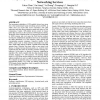Free Online Productivity Tools
i2Speak
i2Symbol
i2OCR
iTex2Img
iWeb2Print
iWeb2Shot
i2Type
iPdf2Split
iPdf2Merge
i2Bopomofo
i2Arabic
i2Style
i2Image
i2PDF
iLatex2Rtf
Sci2ools
110
click to vote
GIS
2009
ACM
2009
ACM
Trajectory simplification method for location-based social networking services
The increasing availabilities of GPS-enabled devices have given rise to the location-based social networking services (LBSN), in which users can record their travel experiences with GPS trajectories and share these trajectories among each other on Web communities. Usually, GPS-enabled devices record far denser points than necessary in the scenarios of GPS-trajectory-sharing. Meanwhile, these redundant points will decrease the performance of LBSN systems and even cause the Web browser crashed. Existing line simplification algorithms only focus on maintaining the shape information of a GPS trajectory while ignoring the corresponding semantic meanings a trajectory implies. In the LBSN, people want to obtain reference knowledge from other users’ travel routes and try to follow a specific travel route that interests them. Therefore, the places where a user stayed, took photos, or changed moving direction greatly, etc, would be more significant than other points in presenting semantic mea...
| Added | 19 May 2010 |
| Updated | 19 May 2010 |
| Type | Conference |
| Year | 2009 |
| Where | GIS |
| Authors | Yukun Chen, Kai Jiang, Yu Zheng, Chunping Li, Nenghai Yu |
Comments (0)

